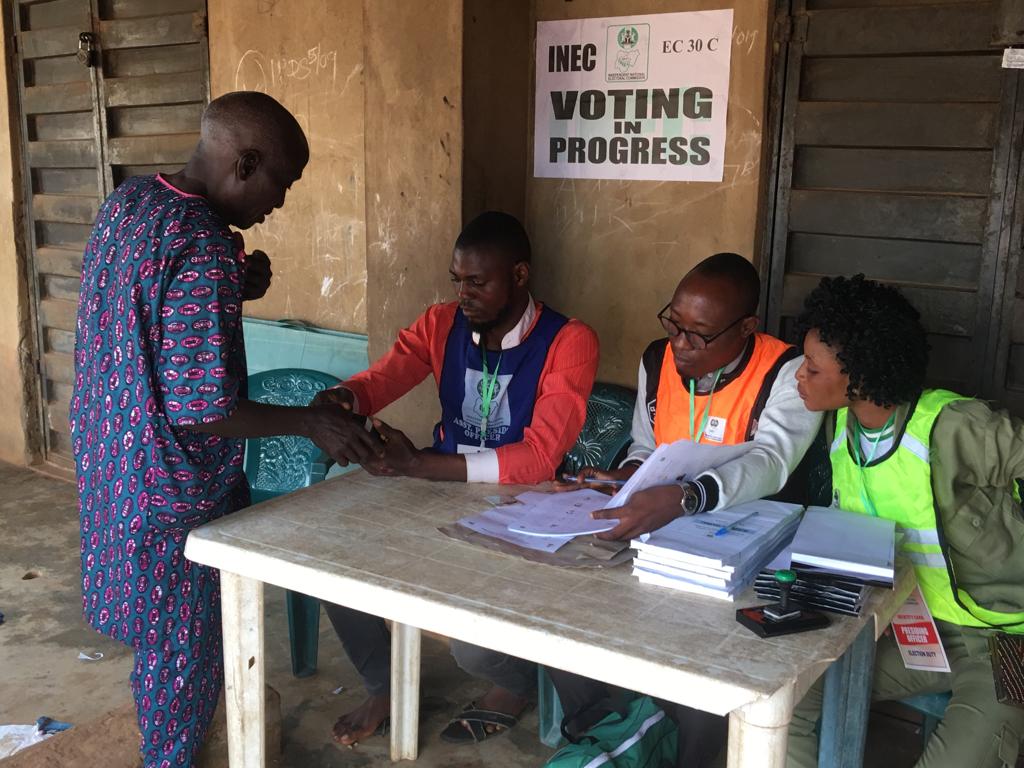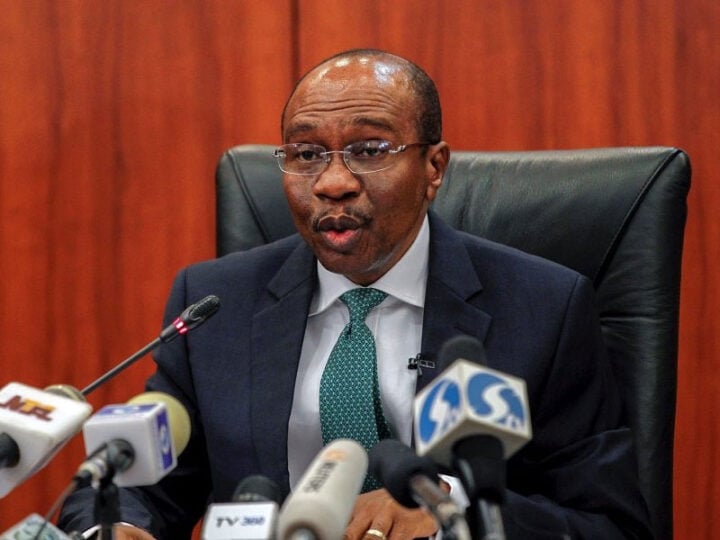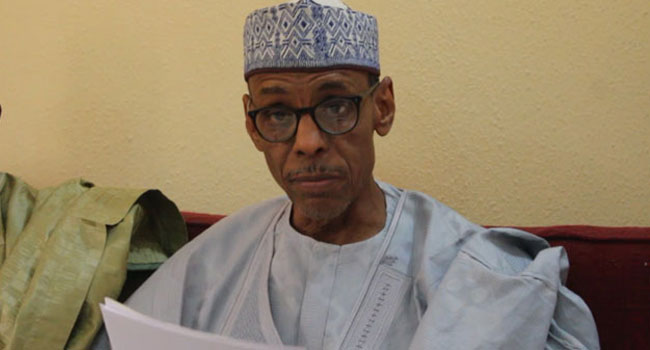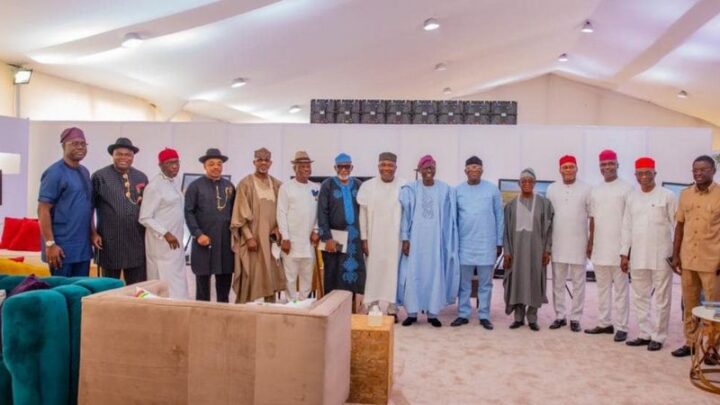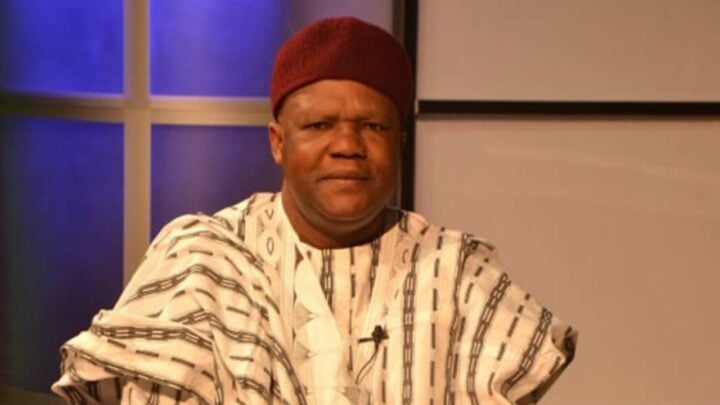Electoral officers accredits a voter in Kogi
As the world eagerly anticipates Africa’s biggest election in 2023, policy capture, process manipulation, and geo-politics are defining the electoral framework reform process as veto players exercise their preferences for policy outcomes. Within the Nigerian context, public confidence in the viability of electoral reforms to address the intractable challenges with Nigerian elections is unquestionable. Unfortunately, this confidence is undercut by political entrepreneurs who are driving the reform process. These actors are determined to substitute public interest for private political gains. Equally undermining public confidence is the limited instrumental outcomes of previous electoral reform efforts. As custodians of public interest, the National Assembly and the executive arms of government bear the burden of ensuring that the current reform process produces sustainable reforms, not ephemeral outcomes. Doing otherwise is a betrayal of public trust and repudiation of public interest.
Three reasons can be ascribed to the uniqueness of the current electoral reform process—first, the comprehensive approach adopted by the 9th National Assembly. Against the background of confusion and ambiguity impelled by fragments of the 2010 Electoral Act, the National Assembly is repealing the current electoral law to enact what could pass for new electoral legislation. The Electoral Bill 2021 (the Bill) is a constellation of the amendments passed in 2010, 2011, and 2015, as well as electoral amendments passed by the 8th National Assembly and proposals from the Independent National Electoral Commission (INEC), political parties, domestic and international observers. Second, the collaborative approach employed by the leadership of the Senate and House Committees on INEC and electoral matters. Mindful of the battle of supremacy and controversy that plagued previous reform efforts, both committees uncharacteristically resolved to work collaboratively on these ongoing electoral reforms. Joint committee retreats and public hearings were organized, and a joint technical committee comprising INEC and the Ministry of Justice was constituted to build consensus on electoral amendments. All these culminated into a single Electoral Bill 2021, which was considered and passed by both chambers in July 2021. Lastly, the vigilance and intensity of citizens’ engagement in the reform process. It took the oversight and pressure from citizens and civic groups to salvage key electoral amendments like the electronic transmission of results, campaign spending thresholds, and the power of INEC to reject false election results when the leadership of the Senate committee allegedly mutilated the committee’s report and made obnoxious insertions in the Bill before its third reading.
In July 2021, both chambers of the National Assembly passed the Bill under controversial circumstances. In the House of Representatives, opposition lawmakers staged a walkout. At the same time, the Senate passed a controversial vote to subject INEC’s constitutional power to electronically transmit election results to the approval of the National Assembly and the Nigerian Communications Commission (NCC), a body unknown to the country’s constitution. Overall, there were points of convergence and divergence in the voting patterns of legislators. In line with legislative practice and procedure, a conference committee must be constituted by the presiding officers of both chambers to harmonize the positions before transfer to the President for assent.
Points of Convergence
Advertisement
Despite the controversies trailing the amendment process, both chambers voted for several legal prescriptions in the Electoral Bill 2021 that will undeniably enhance the quality of Nigerian elections if strictly implemented. The Bill strengthens the financial independence of the Independent National Electoral Commission (INEC) by ensuring that all funding required for a general election is released one year before the date of an election. By the same token, the Bill will facilitate early preparations and effective election logistics management. Compulsory electoral accreditation of voters was legalized, and gender-sensitive language like “she” instead of “he” only was adopted in some sections of the Bill. Other landmark provisions passed by both chambers include, but are not limited to the following;
- Extension of timelines for key electoral activities: A comprehensive breakdown of the timelines in the Bill shows that key electoral activities have been altered to address the logistical challenges posed by unrealistic timeframes in the current electoral act. To mention a few:
- I. Early party primaries: To encourage early primaries, the compilation and submission of the list of candidates are concluded in time to give enough room for planning and printing sensitive electoral materials. The timeframe for submitting the list of candidates to INEC is extended from 60 days to 180 days before the date appointed for a general election. By this provision, all party primaries for the 2023 general election will be concluded by August 2022.
- The period of public campaigns by political parties has been extended from 90 days to 150 days before polling day and to end 24 hours prior to the election day.
- Revised definition of ‘overvoting’: According to the Bill, overvoting occurs where the number of votes cast at an election in any polling unit exceeds the total number of accredited voters in that polling unit. With this new provision, ‘the total number of accredited voters will become a determining factor in the validity of votes in an election instead of the current requirement where overvoting is calculated based on the excess of votes compared to a total number of registered voters. The extant law is a tool exploited by politicians to manipulate electoral outcomes.
- Power to review election results declared under questionable circumstances: The Bill confers INEC with the power to review election declarations and returns made under questionable circumstances. Returning Officers will be kept in check to ensure full compliance with electoral guidelines. The provision will fundamentally transform the results management process and deter politicians from compelling polling officials to declare fabricated election results.
- Candidate substitution in the event of a candidate’s demise in an election: The new Bill addresses a lacuna in the current electoral law, which was manifest in the 2015 Governorship Election in Kogi State, where a candidate died before the result of that election was announced. The Bill allows political parties to conduct primary elections to replace a candidate who dies after the commencement of polls and before the announcement of final results and declaration of a winner. In this circumstance, a timeline of 21 days is provided for INEC to conclude an election and declare a winner. It goes further to prescribe that in the case of legislative elections, the election will start afresh, and a political party affected by the demise of a candidate can conduct fresh primaries within 14 days to nominate a new candidate. However, in the case of presidential and governorship elections, the running mate of the deceased candidate will continue with the election and nominate a running mate.
- Resolution of controversies prompted by the duality of the jurisdiction in pre-election cases: The Bill ousts the jurisdiction of the High Court of a State and FCT to entertain matters challenging the eligibility of a candidate. In addition, the Bill confers exclusive jurisdiction on the Federal High Court to entertain pre-election matters, especially matters relating to the eligibility of candidates. The intendment of the lawmakers is that the provision will mitigate the avalanche of conflicting judgments occasioned by decisions of courts of coordinate jurisdiction.
Points of Divergence
The voting pattern in the Senate and House of Reps indicates legislators diverged on sixteen clauses in the Bill. As evinced in the voting pattern, most of the legislators voted to advance partisan interests at the expense of public interest. However, this review will focus on three main issues which are germane to the ongoing reforms and the future of the electoral process in Nigeria:
Advertisement
- On electronic accreditation of voters: The Bill makes provisions for electronic accreditation of voters using the Smart Card Readers or any technological device as may be determined by INEC. While both chambers voted in favor of electronic accreditation of voters, the House of Representatives redrafted the provision and deleted the phrase ‘any technological device’ based on a motion for amendment moved by the Speaker of the House, Rt. Hon Femi Gbajabiamila. The House of Representatives position is too constricting and counterproductive, as it will certainly impede on INEC’s ability to deploy new technologies for voter accreditation.
- On the electronic transmission of results: In line with constitutional practice, the Bill conferred INEC with the powers to determine the procedure for election results transmission. While the House of Representatives adopted the provision of the Bill, the Senate voted to subject INEC’s power to transmit election results electronically to the approval of the National Assembly and the NCC. By all standards, the Senate’s position amounts to a constitutional overreach as it violates Section 78 and Third Schedule Part 1(F) S.15 of the constitution, which stipulates that INEC shall not be subject to the direction of anybody or authority. INEC and other stakeholders have strongly condemned the Senate and urged the harmonization committee when constituted to adopt the House of Representatives position. A recent report released by Yiaga Africa contradicts the NCC’s position that Nigeria is ill-prepared for electronic transmission of results. Data from the 2019 Presidential Election Parallel Vote Tabulation (PVT) shows that election results were transmitted electronically from the polling unit using the Smart Card readers. Since August 2020, INEC has conducted elections and transmitted election results from 20 States and the FCT, covering 26 constituencies spread across 83 LGAs. The Yiaga Africa report validates INEC’s position on its preparedness to deploy technology to transmit election results fully. Unfortunately, the Senate insists on retaining its position on e-transmission of results.
Aside from the unconstitutionality of the Senate’s position, one of the concerns expressed by stakeholders is the probability that data privacy and confidentiality may be compromised. If the Senate’s provision is adopted, Mobile Network Operators may be forced to divulge technical and confidential information to politicians in the National Assembly. The National Assembly could withhold approval if the MNOs decline to share confidential information, thereby jeopardizing the electronic transmission of results and other innovations in the future.
- On the nomination of candidates by parties: Based on a motion for amendment moved by the Speaker of the House, the House of Representatives voted to expunge ‘indirect primaries’ as a mode for the nomination of candidates. Parties will be legally required to nominate candidates through direct primaries. In contrast, the Senate voted to retain direct and indirect primaries for the nomination of candidates.
The Dilemmas
The arena of political action will shift from the legislature to the Presidency as soon as the divergent positions are harmonized. As the harmonization process begins, the committee is expected to navigate four dilemmas. First, whose interest should the electoral law serve? Public interest or the deeply entrenched partisan interests of politicians? Second, what level of deliberate discretion should be granted to INEC to determine the procedure for elections? Won’t it amount to legislative overkill to maintain an overly prescriptive approach in an electoral law? Third, how can the high demand for electoral technology be managed against its potential risks to democracy? Lastly, what trade-offs will both chambers make to reach a consensus, given the strong divergent positions on the three crucial amendments highlighted in this article and the political heavyweights behind the proposed amendments?
Public interest should always supersede partisan private interests. As custodians of the public interest, elected representatives are required to respect the will of the people when making laws. Jettisoning amendments like electronic transmission of results and electronic voting will betray public trust considering the current realities and the clamor for these rules. The electoral act provides a broad framework for election management; therefore, the nitty-gritty of the electoral process should be confined to electoral guidelines and regulations. Vesting discretionary and rulemaking powers on INEC in certain circumstances promotes innovation, creativity, and institutional responsiveness to rapid transformations in the electoral space, especially with respect to the digitization of the electoral process. No doubt, electoral technology will improve the integrity of elections, but it presents no guarantee that elections will stay clean. Nigeria cannot afford to surrender her democracy to machines; therefore, maximum safeguards must be instituted when deploying electoral technology.
Advertisement
In the final analysis, reform negotiation and implementation is a highly politicized process and a marketplace for political trade-offs and winsets. The big question is whether legislators see this reform process as an opportunity to reconnect the state to citizens or a window to change the rules of the game to guarantee their victory in the next elections. The riposte I consider viable is sustained external pressure from citizens, without which the chances of long-lasting outcomes are slim.
Itodo is an election, democracy, and public policy enthusiast. Itodo serves as the executive director of Yiaga Africa and the convener of the Not Too Young To Run movement. He is a member of the board of advisers of International IDEA, an intergovernmental organization that supports and promotes democracy around the world. Please send comments and feedback to [email protected]. He tweets @DSamsonItodo.
Views expressed by contributors are strictly personal and not of TheCable.

